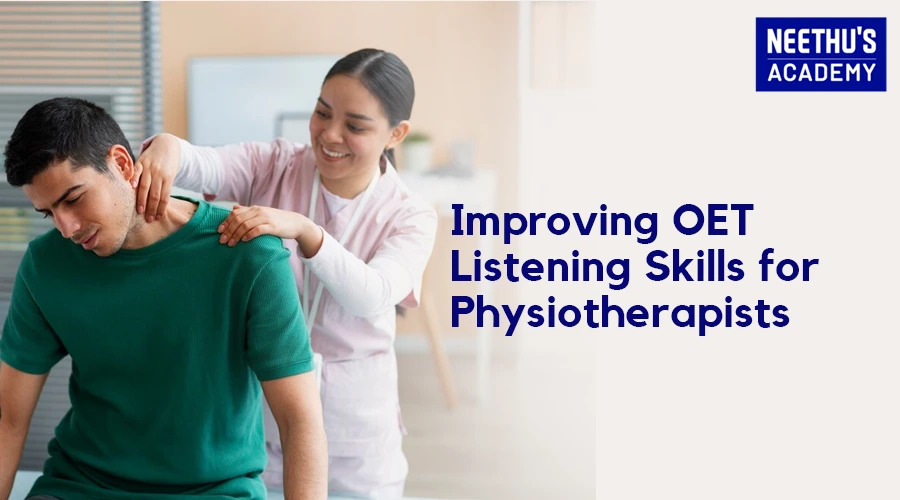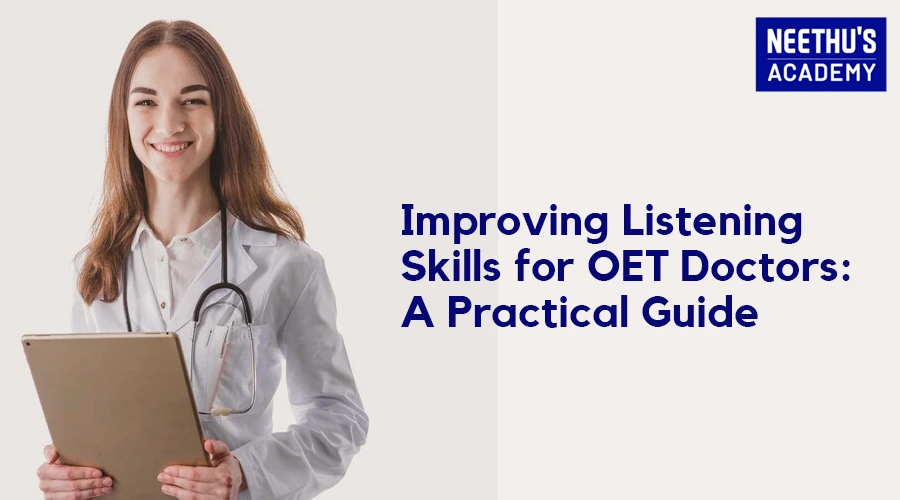OET in Healthcare Industry : How It Supports Healthcare
The world communicates in different languages. From different sources across the web report, the world has around 7000 languages and the most widely spoken is English. As job opportunities improved, wages increased, and economies were safer, more people began finding work in richer countries. However, when it came to the subject of migration, there was a major hurdle in language. Knowing the necessity for effective communication while abroad, proficiency tests in languages were devised. For working or studying in English-speaking countries, there are a few English language tests out there like IELTS, TOEFL, PTE, and OET.
Health professionals in English-speaking countries have to demonstrate their level of fluency in the language to communicate effectively with their patients, other practitioners, and regulatory agencies. This is where OET comes into the picture. OET tests the English proficiency of health professionals and is not like any other general test of English proficiency. We shall discuss in this blog OET matters and its importance in the health sector, how it differs from the standard English tests, and why it’s pretty essential for those aspiring to pursue a career in the healthcare profession.
What is OET?
Health professionals aiming to enroll and practice in English-speaking environments can utilize the Occupational English Test(OET) as a benchmark for their communication skills. OET is particularly designed for health professions such as medical, nursing, dentistry, pharmacy, physiotherapy, and veterinary science – and hence is unique as opposed to the other standard tests, such as IELTS, TOEFL, or PTE. It is more relevant to the real scenario since it centers on the language tasks that professionals are likely to encounter in healthcare settings.
The OET Exam consists of four subtests including:
Listening: The applicants must listen to consultations and presentations and be tested on their ability to listen to English speech.
Reading: This is a test on the ability of one to comprehend texts healthcare-related, such as research articles and guidelines for clinical policy, case notes about patients, etc.
Writing: Candidates have to be able to write professional documents including referral letters or discharge summaries based on a case note or a patient scenario.
Speaking: This section examines the ability of a client to communicate with the patients, colleagues, or carers in simulated true-to-life patient care scenarios.
The test’s format and structure make sure that the test takers are evaluated not just on their language skills but also on their healthcare skills and competence.
Importance of OET in Healthcare Industry
Poor communication in the health care industry can lead to very grave outcomes: a wrong diagnosis, wrong treatment, and even harm to a patient. Let’s take a look at some of the reasons why OET is inevitable in the health care sector.
Patient safety: A healthcare professional while in clinical situations should express medical facts that are complex in simple and lucid words. Miscommunication can lead to severe medical errors. OET tests whether healthcare professionals have the necessary linguistic competencies that make communication safe and fluent, which will consequently ensure the safety of the patient.
Professional Interaction: In the healthcare sector, cooperation is significantly essential. Health practitioners including physicians, nurses, and pharmacists need to communicate with each other frequently. This requires managing the treatment, discussing a patient’s case, and even making a vital decision. OET allows medical professionals to develop linguistic competence that will help them work effectively with their counterparts.
Cultural Competence: The second requirement for working with people who come from diverse backgrounds is knowledge of cultural eccentricities, which is as much a hallmark of effective healthcare communication. OET equips the medical staff with the skills that help them connect with patients in sensitive and culturally aware manners thus being able to live up to the needs of the exponentially globalization of healthcare systems.
Adherence to International Standards: Some countries like Singapore, Australia, New Zealand, UK and Ireland have tough language standards for healthcare providers. Most of the regulatory bodies in the health care sector acknowledge OET to be an obligatory tool to assess whether the practitioners meet these criteria or not. Good license and registration to practice is often conditional on attaining the requirements of OET.
Clear Documentation: Writing reports, making care plans, and maintaining accurate records are the duties of healthcare providers. Poorly written documentation may lead to confusion and poor treatment. OET tests the writing skills of the candidates to ascertain that they can produce medically acceptable and well-structured documentation.
What is the Purpose of the OET Exam?
The OET exam mainly assesses the English language ability of health professionals in a professional context relevant to their own specific professions. While other language tests differ, OET focuses on the professional language skills practiced for everyday work and thus does not simply measure general English ability.
The purposes of OET are as follows:
Specialized Health Care Communication: OET requires professionals to communicate appropriately so that they would be able to convey complex information and understand similar information in the clinical context.
Interaction with the Patient: The speaking section of OET tests one’s ability to communicate successfully with the patient through mimicry of consultations and conversations usually held with the patients by health professionals.
Professional Documentation: The OET writing test checks whether or not a candidate is capable of producing documents for the healthcare sector and can write treatment plans, case notes, and referral letters appropriately.
Listening and Understanding: OET confirms whether or not medical professionals can understand discussions about case conferences and patient consultations plus formal presentations in the medical sector.
In a nutshell, the OET test aims to check if medical professionals have the competence in the English language skills that would be utilized while providing safe and effective care in an English-speaking healthcare environment.
Who recognizes OET?
OET is widely recognized by healthcare regulatory bodies, government agencies, and universities in many countries where English is spoken. To seek work or to pursue studies in most countries, health professionals have to demonstrate their proficiency by passing the examination of OET. Some of the main organizations that recognize OET are:
United Kingdom: The Nursing and Midwifery Council (NMC), General Medical Council (GMC), and Health and Care Professions Council (HCPC).
Australia: Australian Health Practitioner Regulation Agency (AHPRA) for a wide range of health care professions.
New Zealand: Medical Council of New Zealand (MCNZ) and Nursing Council of New Zealand (NCNZ).
Ireland: Nursing and Midwifery Board of Ireland (NMBI).
Singapore: Singapore Medical Council (SMC) and Singapore Nursing Board (SNB).
Dubai and the UAE: Dubai Health Authority (DHA) and Health Authority Abu Dhabi (HAAD).
It is an indication that the regulatory bodies recognize OET’s existence as a valid test of language ability in healthcare providers.
How is the OET Test different from other Language tests?
Although reading, writing, speaking, and listening subtests are key components for OET, IELTS, and TOEFL, there are so many distinguished differences between the standard exams and OET.
Firstly, topic focus marks a key difference. While IELTS and TOEFL are general tests of English proficiency, broad-ranging in topic, OET is specific to healthcare professionals and uses medical language and settings. For instance, while you practice writing case summaries or recommendation letters for the OET writing tasks, IELTS asks you to write essay responses on many topics.
Also, OET highly emphasizes practice since it tests English proficiency for use in specific practice within health settings, such as consulting patients. IELTS and TOEFL evaluate academic or daily English, which may not be used in medical health settings.
OET also has a specialization with tests specially designed for various health professions such as nursing, dentistry, and pharmacy. Exams for general English, such as IELTS, have standardized tests appropriate for all professions.
Furthermore, the speaking section in OET contains role-play-like scenarios specific to the healthcare profession, such as discussing a diagnosis or a choice of treatment, which do not exist in any general test.
Last and certainly not the least, what gives OET an edge is its recognition by a lot of regulatory bodies. Due to its market-specific nature, regulatory bodies in the UK, Australia, and New Zealand prefer OET for health professionals more often than not.
Conclusion
The OET exam is valuable to the healthcare sector as it tests the language skills of professionals so that they can offer safe and effective treatment. It is the best English proficiency test for those intending to work in the healthcare sector in English-speaking countries due to its emphasis on real-world settings and broad recognition by regulatory authorities. The gap between linguistic competence and actual communication in medical situations is filled by OET, which enhances patient safety, professional relationships, and overall healthcare results. The demand for OET will continue to increase in the future because the demand for competent healthcare professionals will be on the increase globally in the coming years.
Frequently Asked Questions





